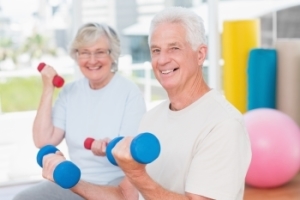
Each year, more than one-third of people age 65 or older fall. Falls and fall-related injuries, such as hip fracture, can have a serious impact on an older person's life. If you fall, it could limit your activities or make it impossible to live independently.
Maintaing your balance is crucial. Balance exercises, along with certain strength exercises, can help prevent falls by improving your ability to control and maintain your body's position, whether you are moving or still.
Some exercises can make you less likely to fall. They do this because they:
- Make your muscles stronger
- Improve your balance
- Make your muscles more flexible
- Increase how long you can be active
When you exercise, always make sure you breathe slowly and easily. Do not hold your breath.
Beneficial Balance Exercises
- You can do some balance exercises during everyday activities.
- While waiting in line at the store, try balancing on 1 foot.
- Try sitting down and standing up without using your hands.
Toe Stand - What it does: Makes your calves and ankle muscles stronger.
- Hold on to a solid support for balance, like the back of a chair.
- Stand with your back straight and slightly bend both knees.
- Push uponto your tiptoes as high as possible.
- Slowly lower your heels to the floor.
- Repeat 10 - 15 times.
Knee Curl - What it does: Makes your buttock and lower back muscles stronger.
- Hold on to a solid support for balance, like the back of a chair.
- Stand with your back straight, feet shoulder width apart, and slightly bend both knees.
- Lift 1 leg straight back behind you, then bend your knee and bring your heel toward your buttock.
- Slowly lower your leg back to a standing position.
- Repeat 10 - 15 times with each leg.
Leg Extension - What it does: Makes your thigh muscles stronger and may decrease knee pain.
- Sit in a straight-back chair with your feet on the floor.
- Straighten 1 leg out in front of you as much as possible.
- Slowly lower your leg back down.
- Repeat 10 - 15 times with each leg.
Stretching the Back of Your Leg - What it does: Makes it easier for you to move around.
- Sit in a straight-back chair.
- Put 1 foot on a low stool in front of you.
- Straighten your leg that is on the stool and reach your hand toward this foot.
- Hold for 10 - 20 seconds, then sit back up.
- Repeat 5 times with each leg.
Other Activities
- Walking is a great way to improve your strength, balance, and endurance.
- Use a walking stick or walker as needed for support.
- As you get stronger, try walking on uneven ground, such as sand or gravel.
Benefits of Tai Chi for Preventing Senior Falls
The benefits of Tai Chi for seniors are incredible. If you are looking for a low-impact, relaxing form of exercise that only requires about 20 minutes a day and rewards your efforts, Tai Chi is for you.
Tai Chi is an internal Chinese martial art in the sense that it focuses on mental and spiritual aspects integrated into movement. This meditative form of exercise consists of a series of 19 movements and one pose. You may have seen groups of people demonstrating its slow-moving circular forms in public parks. Many seniors and senior care facilities have been enjoying this style of workout and conditioning for more than 20 years.
Added Benefits of Tai Chi
- Relieves physical affects of stress
- Promotes deep breathing
- Reduces bone loss in menopausal women
- Improves lower body and leg strength
- Helps with arthritis pain
- Reduces blood pressure
- Requires mind and body integration through mental imagery
- Accumulates energy by releasing endorphins rather than depleting it
- Enhances mental capacity and concentration
- Improves balance and stability by strengthening ankles and knees
- Promotes faster recovery from strokes and heart attacks
- Improves conditions of Alzheimer's, Multiple Sclerosis, and Parkinson's
When to Call the Doctor
If you have pain, dizziness, or problems breathing during or after an exercise, stop and talk with your physical therapist, nurse or doctor.
Related Articles:
Original article and pictures take www.elderoptionsoftexas.com site